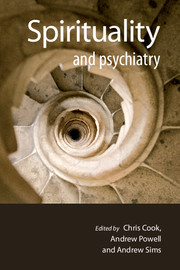Book contents
- Frontmatter
- Contents
- List of contributors
- List of tables, boxes and figures
- Foreword
- Preface
- The Spirituality and Psychiatry Special Interest Group of the Royal College of Psychiatrists
- 1 Spirituality in psychiatry
- 2 Assessing spiritual needs
- 3 Psychosis
- 4 Suicide
- 5 Child and adolescent psychiatry
- 6 Psychotherapy
- 7 Intellectual disability
- 8 Substance misuse
- 9 Neuroscience of the spirit
- 10 Spiritual care in the NHS
- 11 The transpersonal perspective
- 12 Religion and religious experiences
- 13 Pathological spirituality
- 14 Ageing
- Index
1 - Spirituality in psychiatry
Published online by Cambridge University Press: 02 January 2018
- Frontmatter
- Contents
- List of contributors
- List of tables, boxes and figures
- Foreword
- Preface
- The Spirituality and Psychiatry Special Interest Group of the Royal College of Psychiatrists
- 1 Spirituality in psychiatry
- 2 Assessing spiritual needs
- 3 Psychosis
- 4 Suicide
- 5 Child and adolescent psychiatry
- 6 Psychotherapy
- 7 Intellectual disability
- 8 Substance misuse
- 9 Neuroscience of the spirit
- 10 Spiritual care in the NHS
- 11 The transpersonal perspective
- 12 Religion and religious experiences
- 13 Pathological spirituality
- 14 Ageing
- Index
Summary
Within British psychiatry, the notion of linking spirituality with psychiatry developed largely in the 21st century. What follows is the first attempt of the Spirituality and Psychiatry Special Interest Group of the Royal College of Psychiatrists to put their heads together, metaphorically and constructively, and produce a book representing both their diverse views and shared vision for better psychiatric practice. Is the result a manifesto or a shopfront, a confession of our differences or a statement of our common beliefs? We will leave those questions with the reader.
Our first intended readership is the mental health community, including service users and carers, voluntary helpers and mental health professionals of all disciplines in the UK and overseas. Our secondary readership, we would hope, would be all those others who are interested in and concerned with mental illness. We share a belief that an aspiration towards the common good of improved mental health and treatment of mental illness in our communities is a worthy one, and that it is worth striving to turn this into a reality.
Spirituality, including its psychological aspects, is relevant for all psychiatrists, not as an add-on to our already overcrowded curriculum but as an idea ‘at the back of one's mind’, sometimes coming further forward. It is not to be forgotten, permeating every part of psychiatry and forming the underlying worldview from which one practises. If the psychiatrist remembers to incorporate spiritual values into his or her clinical practice, he or she will need to ask the patient a few pertinent questions, thus taking a spiritual history that assesses needs in this area.
How has spirituality entered psychiatry?
Historically, much psychiatric care has been provided within a spiritual or religious context. In medieval Europe, the shrines of St Mathurin and St Acairius in France or St Dymphna in Flanders held a particular reputation for miraculous cures of people with mental illness. In 1247 the priory of St Mary of Bethlehem was founded in Kent, England, for the care of the insane.
Bethlehem Hospital, later known as Bedlam and now as Bethlem Royal Hospital, is the oldest hospital in the UK for people with mental illness. In the Middle Ages, what little care there was for physical diseases like leprosy was provided by religious houses.
- Type
- Chapter
- Information
- Spirituality and Psychiatry , pp. 1 - 15Publisher: Royal College of PsychiatristsPrint publication year: 2009

